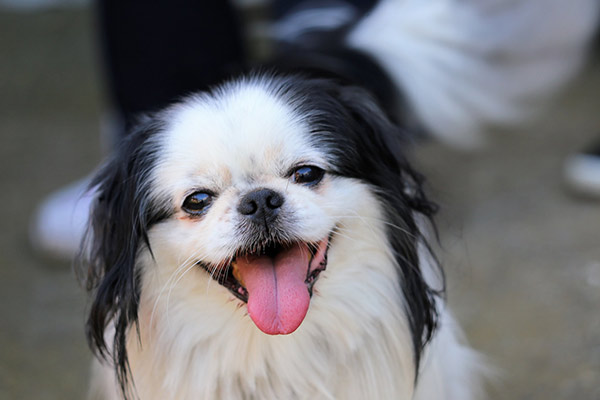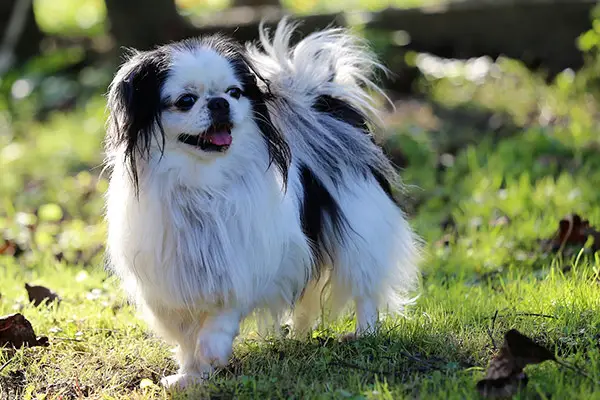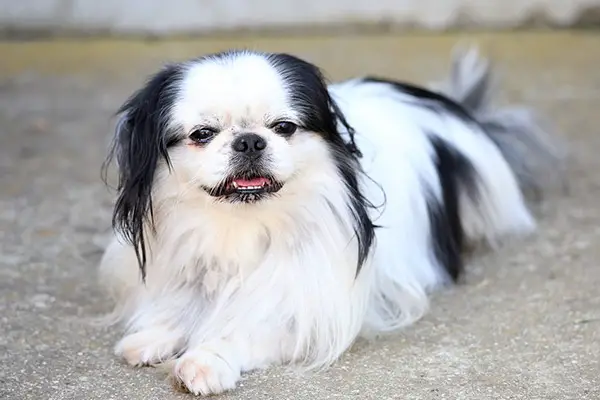Japanese Chins, as their name implies, are small-sized dogs from Japan. The Japanese Chin is a unique looking dog that features a large head, large wide-set eyes, and a short muzzle. Their small bodies are covered with light coats that come in colors of black and white, red and white, or black and white with tan points.
The Japanese Chin is a known well-mannered and happy family dog. They get along well with everyone quickly. Most owners say these dogs can be addictive to have, especially with their charms. Even if you’re an inexperienced owner, a Japanese Chin will not be hard for you to take care of. Give them lots of love and attention, and he’ll return the favor.

Japanese Chin Breed Statistics
| Dog Breed Group | Toy |
| Breed Size | Small |
| Height | 8-11 inches |
| Weight | 7-11 pounds |
| Lifespan | 10-12 years |
Japanese Chin Breed Ratings
| Energy level | |
| Exercise needs | |
| Requires attention | |
| Playfulness | |
| Trainability | |
| Shedding | |
| Grooming | |
| Friendly with family | |
| Friendly with kids | |
| Friendly with strangers | |
| Friendly with other dogs | |
| Prey Drive |
Japanese Chin History
Historians have long debated the history of Japanese Chins, but it is believed that these dogs were of Chinese origin. They are ancient dogs that are thought to have descended from the Tibetan Spaniel, and they came to Japan as a gift from the Chinese emperor to the Japanese emperor.
In Japan, these dogs weren’t considered a dog or an “inu,” but Japanese people consider him a separate being, hence a “chin.” According to historians, there are chances that Japanese Chins were crossed with other small spaniel-type dogs, which contributed to how he looks today.
The Japanese Chin remained on the island for years until the 1600s when Portuguese sailors presented Japanese Chins as a gift to Princess Catherine of Braganza. The next record of chins going out of the island was 1853, when Admiral Commodore Perry gave Queen Victoria a pair of Japanese Chins.
How these dogs got to the United States is unknown, but one thing is for sure, Japanese Chins were very popular. Several famous people, such as President Franklin Pierce and Secretary of War, Jefferson Davis, owned one.
By 1977, the American Kennel Club officially renamed the breed from Japanese Spaniels to Japanese Chins. It currently ranks 104th as the most popular dog breed in the US, and they continue to make affectionate and devoted family companions.

Temperament
Japanese Chins are generally charming, noble, and loving dogs. Although very playful, they are not as hyperactive as other dog breeds. Most people described them as mild-mannered, especially when indoors.
These dogs make excellent companions, especially for those who are not outdoorsy. They love cuddles, and you’ll find them often sleeping on your lap or snuggling under his blanket. To give him the best time, give him all the pampering he needs.
They will make great gifts for senior citizens who want some company at home. These dogs are known to be gentle and loving, but they also need attention. If you’re not at home often, then this dog may not be for you.
Japanese Chins will also not make a great playmate for little children. These dogs do not tolerate rough handling, and they may accidentally injure your child when they misbehave.
But overall, these dogs love people, and they are also polite with strangers. Japanese Chins also don’t have problems getting along with other pets, especially those they grew up with.
Remember, socialization and training are highly essential if you want your dog to achieve the best temperaments. These two things will make him more well-rounded dogs and help him control any bad behaviors.
Training should come easy for these intelligent and responsive dogs. Don’t be harsh with him. Instead, shower him with lots of positive reinforcements, especially praise and food rewards.
Care Requirements
- Nutrition: Like any other dog breeds, Japanese Chins require a high-quality and well-balanced meal to keep him happy and healthy. Diet must consist of a balance of protein, fats, carbohydrates, vitamins, and minerals. It’s highly important to add plenty of fiber in their diet, too, for easy digestion. You can get fiber from fruits and vegetables, so ask your vet for recommendations on what to give your dog. Take note of ingredients they are allergic to also and make sure to stay away from that. Japanese Chins are small dogs, and it’s easy to overfeed them. Make sure to measure the number of calories you feed them in a day. You can also ask your vet for advice, as this will depend on your dog’s age and daily activities.
- Grooming: Japanese Chins have a long, silky coat that sheds seasonally. To maintain it’s high-maintenance appearance, you would need to brush their coat at least once a week. This will help remove dirt and loose hair and prevent mats and tangles from forming. Once the shedding season comes, you might need to brush your dog’s coat daily. It might take more of your time but think of it as a great bonding between you and your dog. You can bathe him once a month or less, depending on how much he needs it. Just don’t forget to clean out their ears regularly to prevent ear infection. Nails should be kept short too so as not to cause pain and discomfort to your dog.
- Exercise: Japanese Chins may not be hyperactive, but they are playful dogs. They will require moderate and regular exercise so he can stay healthy and happy. You can take him out for slow walks around the block or run around and play on a secured yard. Create activities that you can do together as this is more fun for him. If you have other pets, let them all play together, but remain close supervision.
- Health: Japanese Chins are generally healthy and happy dogs. They have a long lifespan, but you still need to be aware of what health conditions they are prone to having. Bone diseases such as patellar luxation and Legg-Calve-Perthes disease are common to these dogs. That’s why it’s essential to get him exercised. They are also prone to eye diseases such as progressive retinal atrophy and cataracts. You also need to watch out for heart diseases like atrioventricular endocardiosis and heart murmurs. You must give your dog the right care and nutrition to keep him healthy. If possible, meet at least one of his parents to know which diseases your dog might get. You can also let him take a screening test to detect health conditions at an early stage.
- Lifespan: The life expectancy of Japanese Chins is 10-12 years.

Fun Facts about Japanese Chins
- Japanese Chins are believed to have been originally developed in China.
- They were dogs of Chinese and Japanese royalties.
- These dogs were bred small enough to fit inside the sleeves of women’s kimonos.
- They were brought outside of Japan because of trading.
- Queen Alexandra popularized the dog breed in Europe.
- They were first called Japanese Spaniels in the US.
- They have cat-like personalities e.g., climbing on things and just being on top.
Check Out Other Toy Dog Breeds:
Affenpinscher, Brussels Griffon, Cavalier King Charles Spaniel, Chihuahua, Chinese Crested, English Toy Spaniel, Havanese, Italian Greyhound, Maltese, Miniature Pinscher, Papillon, Pekingese, Pomeranian, Pug, Shih Tzu, Silky Terrier, Toy Fox Terrier, Yorkshire Terrier
